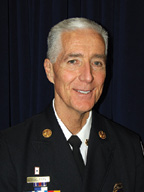
The fire service has an old saying, “There are two things every firefighter hates: change and the way things are.” Understandably, this is probably not unique to us or anyone else, for that matter. There is a wonderful quote that some attribute to the ancient Roman Arbiter Gaius Petronius: “We trained hard, but it seemed that every time we were beginning to form up into teams, we would be reorganized. I was to learn later in life that we tend to meet any new situation by reorganizing; and a wonderful method it can be for creating the illusion of progress while producing confusion, inefficiency, and demoralization.”
Others reference Charlton Ogburn in Merrill’s Marauders: “We trained hard, but it seemed that every time we were beginning to form up into teams we would be reorganized. Presumably the plans for our employment were being changed. I was to learn later in life that, perhaps because we are so good at organizing, we tend as a nation to meet any new situation by reorganizing; and a wonderful method it can be for creating the illusion of progress while producing confusion, inefficiency, and demoralization.”
Language, quotes, and turns of phrase are always evolving to meet different but similar social settings, contexts, and times. Shakespeare’s words from Cato were morphed and repurposed by Patrick Henry in his defiant “Give me liberty, or give me death!” remark that he exclaimed to help inspire his fellow delegates in Virginia to join the cause of liberty against British oppression. Shakespeare from Cato was evoked again by Nathan Hale in his reported final words, “I regret I have but one life to give for my country.”
Although the source of the quotes has been and will be argued over, debated, and researched by scholars with the time, interest, and passion for those sorts of endeavors, the quotes are very helpful for us right now. Perhaps they will always be useful to us. We firefighters have interest in these words not so much for who said them originally or what issues they were referring to at the time but for how they impact us—more specifically, how they help us understand how we feel about what is going on around us all the time and, more importantly, what is going on around us and to us and what we are involved with right now.
The first two sentiments reflect the confusion and angst of those, the troops, having change imposed on them generally by the bosses. If we could interview these troops, I am sure they would tell us they thought the system was doing well as it was and the reorganization was misguided. People get comfortable with their environments, systems, and procedures; for us firefighters, it is our organizational climate, tactics, and tasks that are good and bad.
Comfort, as it is, is not good or bad. Often, comfort comes from experience, wisdom, insight, and hard work. Comfort can also make us less open to new thoughts and ideas. As we gain comfort from familiarity, it provides us with a sense of security. When we are subjected to forced changes for unclear or suspect reasons or if we do not trust the change agents such as Ogburn stated, “Presumably the plans for our employment were being changed,” we get uncomfortable. To us, that would mean our mission was being changed, and by folks we don’t trust.
The quotes would either be ill-informed or spot on, depending on your position as a changer or the one needing to change. Change, however, can be awful or wonderful; if you are the one who must change and it is married to force, punishment, and coercion, not so much. Often, the change agents will use force to ensure you get the message. Change at the point of a gun is a favorite persuasion tactic of folks who view violence/force as necessary to improve our outlook to match theirs.
But we can all be persuaded, inspired, and motivated. Take the Cato-inspired remarks that were used to motivate others in an epic quest—a struggle that reflected the passions of true believers in a cause, a change. The evaluation process of the change often is tied to how things turn out for the organization and its participants or members. Winners write the history.
Understandably, attribution error often is in play, as when an outstanding organization is inherited by someone smart enough to not mess with success and not impulsively reorganize who subsequently experiences a series of wins. And, conversely, when fortunes go south, the leadership bosses are unfairly scapegoated as somehow being deficient in failing to change. The hindsight biases of those reviewing an organization after an event tend to hold leadership accountable for not having been able to foresee the impending disaster or not having prepared more thoroughly for an event by adopting the flavor of the day in tactical evolution, justified or unjustified.
The reasons for reassignment, reorganization, and change can be as varied as there are fire departments in America, but one thing is constant: change, evolution. The effects of change are also somewhat predictable. There is the traditional honeymoon period where everyone is waiting to see if, as in Woody Allen’s classic movie “Bananas,” the new boss will have us wear our underwear on the outside to ensure it’s clean or be more like King Arthur and start building Camelot.
If the change is successful, the troops will eventually say, “We have always done it this way.” If it turns out badly, the troops who had the old chief’s photo on the bull’s-eye of the dartboard in the day room will start organizing the chaplains to hold vigils for their canonization to sainthood.
We all have a favorite/lucky shirt. We wear it when necessary. Our loved ones hate it, but we know it works, if only for us.


